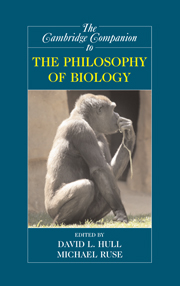Book contents
- Frontmatter
- 1 Adaptation
- 2 Population Genetics
- 3 Units and Levels of Selection
- 4 What’s Wrong with the Emergentist Statistical Interpretation of Natural Selection and Random Drift?
- 5 Gene
- 6 Information in Biology
- 7 Reductionism (and Antireductionism) in Biology
- 8 Mechanisms and Models
- 9 Teleology
- 10 Macroevolution, Minimalism, and the Radiation of the Animals
- 11 Philosophy and Phylogenetics: Historical and Current Connections
- 12 Human Evolution: The Three Grand Challenges of Human Biology
- 13 Varieties of Evolutionary Psychology
- 14 Neurobiology
- 15 Biological Explanations of Human Sexuality: The Genetic Basis of Sexual Orientation
- 16 Game Theory in Evolutionary Biology
- 17 What Is an ‘Embryo’ and How Do We Know?
- 18 Evolutionary Developmental Biology
- 19 Molecular and Systems Biology and Bioethics
- 20 Ecology
- 21 From Ecological Diversity to Biodiversity
- 22 Biology and Religion
- 23 The Moral Grammar of Narratives in History of Biology: The Case of Haeckel and Nazi Biology
- Reference List
- Index
- Series List
5 - Gene
Published online by Cambridge University Press: 28 April 2008
- Frontmatter
- 1 Adaptation
- 2 Population Genetics
- 3 Units and Levels of Selection
- 4 What’s Wrong with the Emergentist Statistical Interpretation of Natural Selection and Random Drift?
- 5 Gene
- 6 Information in Biology
- 7 Reductionism (and Antireductionism) in Biology
- 8 Mechanisms and Models
- 9 Teleology
- 10 Macroevolution, Minimalism, and the Radiation of the Animals
- 11 Philosophy and Phylogenetics: Historical and Current Connections
- 12 Human Evolution: The Three Grand Challenges of Human Biology
- 13 Varieties of Evolutionary Psychology
- 14 Neurobiology
- 15 Biological Explanations of Human Sexuality: The Genetic Basis of Sexual Orientation
- 16 Game Theory in Evolutionary Biology
- 17 What Is an ‘Embryo’ and How Do We Know?
- 18 Evolutionary Developmental Biology
- 19 Molecular and Systems Biology and Bioethics
- 20 Ecology
- 21 From Ecological Diversity to Biodiversity
- 22 Biology and Religion
- 23 The Moral Grammar of Narratives in History of Biology: The Case of Haeckel and Nazi Biology
- Reference List
- Index
- Series List
Summary
The historian Raphael Falk has described the gene as a 'concept in tension' (Falk 2000) - an idea pulled this way and that by the differing demands of different kinds of biological work. Several authors have suggested that in the light of contemporary molecular biology 'gene' is no more than a handy term that acquires a precise meaning only in some specific scientific context in which it is used. Hence the best way to answer the question 'What is a gene?', and the only way to provide a truly philosophical answer to that question is to outline the diversity of conceptions of the gene and the reasons for this diversity. In this essay we draw on the extensive literature in the history of biology to explain how the concept has changed over time in response to the changing demands of the biosciences. In this section we have drawn primarily on the work of Raphael Falk (1986, 1991, 1995, 2000, 2001, 2005, in press), Michael Dietrich (2000a, 2000b), Robert Olby (1974, 1985), Petter Portin (1993), and Michael Morange (1998). When our historical claims are commonplaces that can be found in several of these sources we do not cite specific works in their support. We have also chosen not to explain basic genetic terminology, as this would have occupied much of the chapter. More specialized terms are explained when they cannot be avoided. In the final part of the essay we outline some of the conceptions of the gene current today. The seeds of change are implicit in many of those current conceptions and the future of the gene concept appears set to be at as turbulent as its past.
- Type
- Chapter
- Information
- The Cambridge Companion to the Philosophy of Biology , pp. 85 - 102Publisher: Cambridge University PressPrint publication year: 2007
- 34
- Cited by



